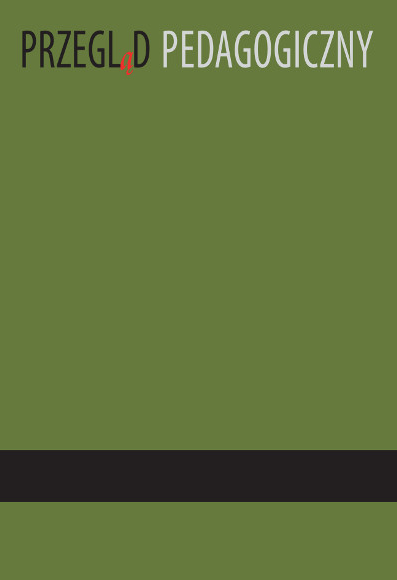In Search of Forms of Support for Active Participationin the Community of Learners and Contact Networks.Study Report
DOI:
https://doi.org/10.34767/PP.2020.02.11Keywords:
pedagogy, modern teaching and learning methods, perspective of learners, Erasmus+ project, contact network, community of learners, cooperationAbstract
The presented article raises issues related to the learning environment based on the engagement and constructive interaction of all its participants, which can also be supported by digital technologies. It draws attention to new opportunities and challenges related to meeting the various needs of young learners. It is also about building a sense of community and support networks, not only with regard to one’s professional future, but also to the exchange of knowledge, experience and ideas. The aforementioned issues have been analysed, among others, in connection with selected research results carried out as part of “The Unteachables” Erasmus+ project, which is the result of cooperation between the Faculty of Education, the Faculty of Biology and Environmental Sciences at the Cardinal Stefan Wyszynski University in Warsaw and partners from Denmark – project coordinator, Spain, Iceland, Slovenia and Italy.
References
Black S., Allen J.D. (2019). Insights from educational Psychology. Part 11: Learning strategies. The Reference Librarian 60(4), 288–303. Accessed on 10 March 2020.
Bruner J. (2010). Kultura edukacji. Transl. T. Brzostowska-Tereszkiewicz. Krakow: Universitas.
Cudowska A. (2018). Kultura szkoły stymulująca kształtowanie uczącej się wspolnoty. Kultura i Edukacja, 3 (121), 129–141.
Cybal-Michalska A. (2013). Młodzież akademicka a kariera zawodowa. Krakow: Oficyna Wydawnicza IMPULS.
Deloitte (2018). First Steps into the Labour Market. International survey of students and graduates. Central Europe. Accessed on 5 March 2020.
Dunlosky J., Rawson K.A., Marsh E.J., Nathan M.J., Willingham D.T. (2013). Improving Students’ Learning With Effective Learning Techniques: Promising Directions From Cognitive and Educational Psychology. Psychological Science in the Public Interest, 14(1), 4–58.
European Commission (2017). Commission Staff Working Document Accompanying the document Communication on school development and excellent teaching for a great start in life, Brussels, 30.5.2017, SWD(2017) 165 final.
European Commission (2019). Key Competences for Lifelong Learning. Luxembourg: Publications Office of the European Union.
European Commission (2018). Study on Supporting School Innovation Across Europe. Final report to DG Education and Culture of the European Commission. Luxembourg: Publications Office of the European Union.
European Commission/EACEA/Eurydice (2019). Digital Education at School in Europe. Eurydice Report. Luxembourg: Publications Office of the European Union.
Europe’s online platform for school education
Ferguson R., Coughlan T., Egelandsdal K. et al. (2019). Innovating Pedagogy 2019: Open University Innovation Report 7. Milton Keynes: The Open University.
Fullan M., Langworthy M. (2014). A Rich Seam: How New Pedagogies Find Deep Learning, London: Pearson.
Growiec K. (2011). Kapitał społeczny. Geneza i społeczne konsekwencje. Warszawa: Wydawnictwo SWPS „Academicas”.
Information about The School in the Cloud project.
Infuture Hatalska Foresight Institute, Dentsu (2019). Gen Z: jak zrozumieć dziś pokolenie jutra.
Kukulska-Hulme A., Beirne E., Conole G. et al. (2020). Innovating Pedagogy 2020: Open University Innovation Report 8. Milton Keynes: The Open University.
Kulpa-Puczyńska A. (2019). Features of ‘New’ Students and the Potential of Future Teachers: First Effects of “The Unteachables” International Project. Forum Pedagogiczne, 9/2, 2, 271–281.
Leppert R. (2014). Trzy szkolne światy – trzy rodzaje tożsamości. Jak spełniają się uczniowskie oczekiwania wobec szkoły, świata i samych siebie?. Studia Pedagogiczne, LXVII, 129–140.
ManpowerGroup (2016). Millennial Careers: 2020 Vision. Facts, Figures and Practical Advice from Workforce Experts.
ManpowerGroup (2018), Skills Revolution 2.0. Robots Need Not Apply: Human Solutions for the Skills Revolution.
Melosik Z. (2013). Kultura popularna i tożsamość młodzieży. W niewoli władzy i wolności. Cracow: Oficyna Wydawnicza IMPULS.
OECD (2017). PISA 2015 Results (Volume III): Students’ Well-Being, Paris: PISA, OECD Publishing, DOI: 10.1787/9789264273856-en
Tapscott D. (2009). Grown Up Digital. How the Net Generation is Changing Your World. Introduction. Published by The McGraw-Hill Companies, Inc.
Thornton P., Flynn K. (2003). Entrepreneurship, Networks, and Geographies. In: Z.J. Acs, D.B. Audretsch (eds.), Handbook of Entrepreneurship Research. Great Britain: Kluwer Law International.
Twenge J.M. (2019). iGen. Dlaczego dzieciaki dorastające w sieci są mniej zbuntowane, bardziej tolerancyjne, mniej szczęśliwe – i zupełnie nieprzygotowane do dorosłości – i co to oznacza dla nas wszystkich. Transl. O. Dziedzic. Sopot: Wydawnictwo Smak Słowa.
Downloads
Published
Issue
Section
License

This work is licensed under a Creative Commons Attribution-NoDerivatives 4.0 International License.

